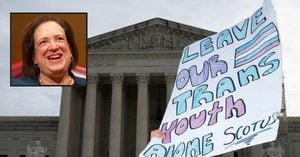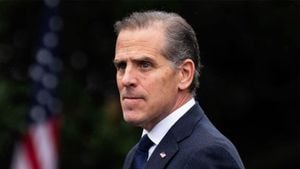Keir Starmer is reportedly planning to award peerages to Sue Gray and several former Labour MPs who stepped down from safe seats prior to the upcoming General Election on July 4. This development suggests Starmer is strategizing to bolster his support among party insiders and strengthen his position as party leader.
Sources within Labour have indicated to the Financial Times the existence of a long list of intended political peerages, which includes Gray, his former chief of staff. Gray's exit from her role earlier this year was marked by significant discord at Number 10, leading to her swift replacement by Morgan McSweeney, widely considered a close ally of Starmer.
Despite her resignation from the chief of staff role, Gray was said to be taking on the position of nations and regions envoy. Yet, news broke recently of her rejection of this position, adding another layer of complexity to her potential elevation to the House of Lords.
Adding to the intrigue, several other former Labour MPs who vacated their seats before the General Election are also anticipated to receive peerages. Notable names include Lyn Brown, Kevin Brennan, and Julie Elliott. Thangam Debbonaire, who lost her seat to the Green party during Starmer's shadow cabinet tenure, is likewise under consideration for this honor.
Meanwhile, the current political climate is marked by uncertainty, as former Conservative Prime Minister Rishi Sunak has not yet submitted his resignation list for proposed peerages. With time running out before the end of the year, speculation suggests former cabinet ministers like Michael Gove and Simon Hart might be included on Sunak's list.
With only 187 Labour peers currently sitting against 273 Conservatives, 78 Liberal Democrats, and 184 non-affiliated cross-benchers, this move to increase Labour's representation appears strategic. Earlier this year, Labour abolished the 92 seats traditionally reserved for hereditary peers. This was part of Starmer’s broader reform agenda, but the Scottish National Party (SNP) is advocating for even more drastic changes, pushing for the complete abolition of the House of Lords. SNP MP Pete Wishart criticized the House of Lords (Hereditary Peers) Bill as inadequate and called for reform to make legislative representation more democratic and reflective of popular consent.
“If you represent the people, you should be voted by the people,” Wishart remarked during debates, emphasizing the necessity of electoral mandates for lawmakers.
Starmer's recent actions, particularly the plans for peerages, reflect both solidarity with his allies and maneuvering against his political foes, as he looks to strategically position Labour for the upcoming elections and consolidate power within the party. With the timeline for these appointments coinciding closely with the looming election, the stakes have never been higher for both Starmer and the Labour Party.
The peerage allocations are laden with expectation and strategic significance. If Starmer manages to implement this plan effectively, it could potentially reshape the dynamics of the House of Lords, influencing both Labour’s internal politics and its external political standing as they approach the election.
Despite Starmer's efforts to modernize the Labour Party and its practices, the opposition critiques remain loud and persistent. Critics question whether awarding peerages is truly the reform needed to engage voters and overcome perceived elitism.
Political analysts suggest this strategy of enhancing the House of Lords with Labour allies is also part of Starmer's broader vision to create opportunities for party members and loyalists, establishing his commitment to strengthening the party from within. The balance between honoring past service and keeping party unity will undoubtedly be pivotal as Labour heads toward the General Election.
Going forward, it remains to be seen how Starmer will navigate these complex waters and whether his plans for peerages will solidify or challenge his leadership within the party. The upcoming weeks will be telling, as the political stage is set for pivotal changes and potential confrontations within Parliament.



